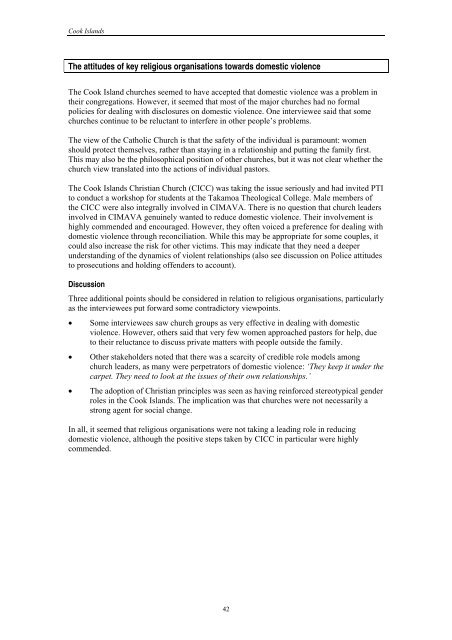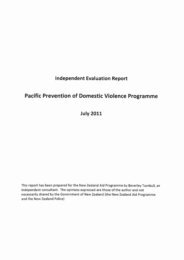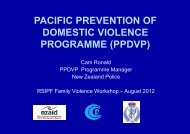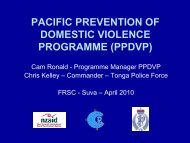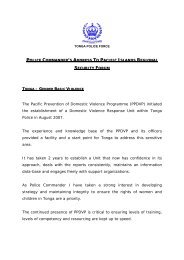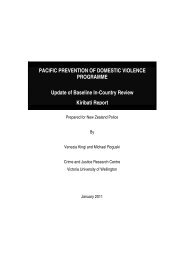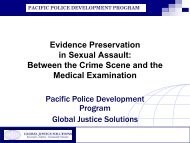Cook Islands - Pacific Prevention of Domestic Violence Programme
Cook Islands - Pacific Prevention of Domestic Violence Programme
Cook Islands - Pacific Prevention of Domestic Violence Programme
You also want an ePaper? Increase the reach of your titles
YUMPU automatically turns print PDFs into web optimized ePapers that Google loves.
<strong>Cook</strong> <strong>Islands</strong><br />
The attitudes <strong>of</strong> key religious organisations towards domestic violence<br />
The <strong>Cook</strong> Island churches seemed to have accepted that domestic violence was a problem in<br />
their congregations. However, it seemed that most <strong>of</strong> the major churches had no formal<br />
policies for dealing with disclosures on domestic violence. One interviewee said that some<br />
churches continue to be reluctant to interfere in other people’s problems.<br />
The view <strong>of</strong> the Catholic Church is that the safety <strong>of</strong> the individual is paramount: women<br />
should protect themselves, rather than staying in a relationship and putting the family first.<br />
This may also be the philosophical position <strong>of</strong> other churches, but it was not clear whether the<br />
church view translated into the actions <strong>of</strong> individual pastors.<br />
The <strong>Cook</strong> <strong>Islands</strong> Christian Church (CICC) was taking the issue seriously and had invited PTI<br />
to conduct a workshop for students at the Takamoa Theological College. Male members <strong>of</strong><br />
the CICC were also integrally involved in CIMAVA. There is no question that church leaders<br />
involved in CIMAVA genuinely wanted to reduce domestic violence. Their involvement is<br />
highly commended and encouraged. However, they <strong>of</strong>ten voiced a preference for dealing with<br />
domestic violence through reconciliation. While this may be appropriate for some couples, it<br />
could also increase the risk for other victims. This may indicate that they need a deeper<br />
understanding <strong>of</strong> the dynamics <strong>of</strong> violent relationships (also see discussion on Police attitudes<br />
to prosecutions and holding <strong>of</strong>fenders to account).<br />
Discussion<br />
Three additional points should be considered in relation to religious organisations, particularly<br />
as the interviewees put forward some contradictory viewpoints.<br />
• Some interviewees saw church groups as very effective in dealing with domestic<br />
violence. However, others said that very few women approached pastors for help, due<br />
to their reluctance to discuss private matters with people outside the family.<br />
• Other stakeholders noted that there was a scarcity <strong>of</strong> credible role models among<br />
church leaders, as many were perpetrators <strong>of</strong> domestic violence: ‘They keep it under the<br />
carpet. They need to look at the issues <strong>of</strong> their own relationships.’<br />
• The adoption <strong>of</strong> Christian principles was seen as having reinforced stereotypical gender<br />
roles in the <strong>Cook</strong> <strong>Islands</strong>. The implication was that churches were not necessarily a<br />
strong agent for social change.<br />
In all, it seemed that religious organisations were not taking a leading role in reducing<br />
domestic violence, although the positive steps taken by CICC in particular were highly<br />
commended.<br />
42


